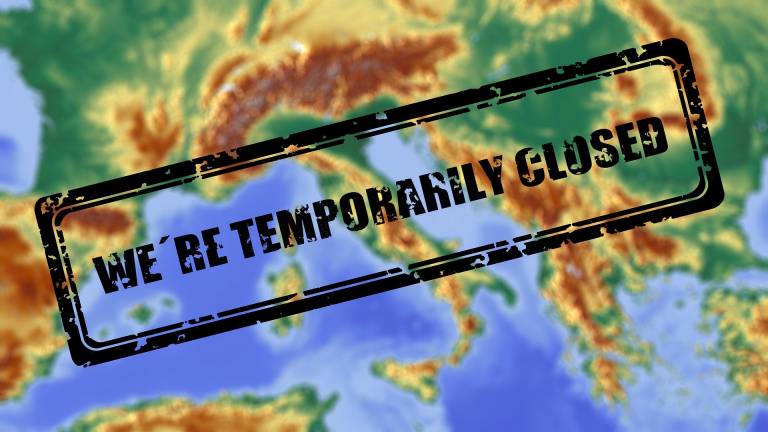Thinking, researching or moral and political reasoning should not end with us merely stating that things are very complicated.
The text is based on Lahikainen’s lectio praecursoria.
In Finland, people still tend to believe that the effects of climate change are somewhere else, in the future and on other continents, and that Finns could hardly make a difference in mitigating climate change.
Yet, the carbon footprint of Finns is higher than the European average, Finnish technology is exported around the world, and the Finnish social system has garnered plenty of global interest in recent years despite the country’s small size.
Although Finland, according to current estimates, is not among the most vulnerable countries, by no means are Finns perfectly safe. In the global economic system, problems in one place may cause problems in another. The occurrence of extreme weather conditions is expected to increase in Northern Europe, as well. Due to perpetual drought in the early summer of 2018, forest fire warnings were issued throughout Finland, while during the winter, heavy snow caused power blackouts in the North-East of the country. These were only signs of what is to come. A climate change that is completely out of our control would cause global chaos. Many impacts of climate change are familiar disaster movie tropes: drought, tsunamis, and hurricanes.
However, a massive disaster, to the much same effect to those involved, may be the encephalitis and the potential permanent neurological damage caused by a tick bite.
The complexity of climate change compels us to epistemic humility but does not justify epistemic cowardice. One of the results of my dissertation (Lahikainen 2018) is that, if such person infected by a tick bite, for instance a young person from Lappeenranta, claimed CEOs of energy companies were partly responsible for their situation, they may be right.
Plenty of students and families live in the district of Sammonlahti in the southeastern town of Lappeenranta. The area also has a considerably large population of ticks, relatively many of which carry Lyme disease and the particularly dangerous tick-borne encephalitis (TBE). Between the years 2011 and 2015, 9 cases of TBE were reported in the area.
This relates to climate change in that mild winters and wet summers improve living conditions for ticks, according to current research.
Had the young person been bitten by a tick if it were not for climate change? Perhaps, perhaps not. Perhaps they may have not even been alive because without the social changes caused by the Industrial Revolution their grandparents may have never met each other. This is an imaginary, yet plausible example. We could tell a complicated, but again, to our knowledge, plausible story where this exact infection can be traced back to climate change and therefore to the physical causes of climate change and from there on to its social causes, and, perhaps, eventually, to the actions of certain individuals.
Climate change, diseases and ecosystems are complexly interrelated. Social systems are complicated. Understanding the complexity of things is the reason for epistemic humility. The limited scope of our own understanding must be taken seriously. Complexity still cannot be the reason for epistemic cowardice. Thinking, researching or moral and political reasoning should not end with us merely stating that things are very complicated.
Despite all this complexity, the young person from Sammonlahti, perhaps a tech student, may have not been infected if the energy company Exxon Mobil had released their 1977 research results on climate change which would had led to political, financial and social counteractions to prevent climate change. Instead, Exxon Mobil together with other energy companies financed thinktanks to produce climate-denialist misinformation and to lobby politicians and other influencers (Oreskes & Conway 2010).
Who can be held responsible for climate change?
Ten years ago, a renowned climate researcher, James Hanson, wrote: “CEOs of fossil energy companies know what they are doing and are aware of long-term consequences of continued business as usual. In my opinion, these CEOs should be tried for high crimes against humanity and nature.”
My dissertation examines moral responsibility. It differs from juridical responsibility, although moral reasoning may often resemble juridical reasoning and have the same principles.
In philosophy, moral responsibility is of special interest to researchers of ethics and moral philosophy. Although, for instance in philosophy of mind, philosophy of psychology, and metaphysics, researchers have recently also examined responsibility in relation to issues of freedom of will. A near-indisputable principle in the discussion of moral responsibility is that one can be responsible only for those issues that can somehow be affected.
This has inclined many philosophers to think that people as individuals cannot be responsible for climate change. If I can impact climate change only slightly or not at all, am I then responsible for climate change?
If we are talking about who can be blamed for climate change, we are talking about retrospective, backward-looking responsibility. If climate change were to have happened about the same way regardless of what any individual would have done, can we then put the blame on any one individual?
Whereas, if we are to examine who should do something to combat climate change, it is forward-looking, prospective responsibility. If no action by a single individual will be enough on their own, is there any individual responsibility even when looking forward?
If the individual does not know what they are doing and is unaware of the long-term effects of their actions, are they then responsible? Yes, at least if the matter is serious and the individual had to opportunity to educate themselves. Climate change is clearly a serious matter, and information is vastly available. It is less clear what effects the actions of individuals have and have had.
Researchers of climate ethics have proposed various solutions to these problems. Many may disagree with Dale Jamieson’s (1992) description “the global environment may be destroyed, yet no one will be responsible”. Similarly, Sinnott-Armstrong (2005) argues that it is morally acceptable to drive for fun on a Sunday as long as you pressure politicians to enact a law that forbids these Sunday joyrides, which many rightly disclaim.
A solution is to think that each individual could have their own personal carbon budget, and exceeding this limit means participating in producing climate change. In this case, the individual is partly responsible for the problems caused by climate change if they are to exceed their own budget. Most people living in rich, Western countries live outrageously beyond their carbon budget. Alternatively, we can confess that no emissions produced by any individual alone make a difference, but to state that, in this situation, individuals are responsible for forming a collective that manages everyone’s emissions (Fragnière 2016).
The normal function of global capitalism causes climate change
A common denominator for these solutions is how they treat climate change as a problem caused by collective action. Climate change is thought to be the result of emissions produced by billions of independent individuals. This perspective, or rather, model, brings us to perhaps the most controversial question in climate ethics: In what ways, if any, are individuals responsible for climate change? This question is often rephrased as: Do individuals have a moral responsibility to decrease their greenhouse gas emissions?
The premise of my dissertation is different. I argue that climate change should be treated as a social structural rather than an individual problem. Individuals are, in fact, interdependent and function within the social context. Our societies are structured so that their normal function causes climate change. A central structure in my dissertation is global capitalism which inherently runs on endless economic growth and profit-seeking.
Social structures both restrict and enable action. They shape us, but they are also the product of human action.
The central questions of my dissertation are:
How to understand the moral responsibility of individuals regarding climate change,
1) if climate change is linked to social structures, particularly global capitalism
2) and, if individuals, their characteristics, habits and abilities to act responsibly are shaped by these very social structures?
Firstly, this means that individuals are in different ways responsible depending on their social status. If society is highly hierarchical, some individuals may have considerable responsibility. We need to examine how societies are built, the actions of individuals, and their opportunities within this framework.
In other words, from a structural point of view, it is both a philosophical and an empirical question how much and in what way is each single individual responsible for climate change, as it is an empirical question to what extent and in what ways can an individual impact the society at large. Climate change and responsibility cannot be examined as separate from power relations.
Climate change and responsibility cannot be examined as separate from power relations.
Secondly, this means that the emissions of individuals, however they be calculated, are not the only nor the most central issue for climate ethics. We should rather examine how individuals in their different roles and positions uphold, challenge, and perhaps also shape and create new social structures.
Thirdly, this means that we do not fully know what responsibility is nor do we discern the limits of our moral ignorance. Our moral agency, here, our ability to act responsibly, and our moral theory as well our theory of responsibility have been shaped by the same structures that cause climate change.
Finally, it means that climate change is linked to other forms of social and structural inequalities. Climate change is a threat mostly to those in vulnerable situations, both people and animals. The benefits of climate change are enjoyed only by few. Structural inequality together with climate disaster may lead to even greater injustice.
So, is climate change anyone’s fault? And if so, who should act and how?
With great power come great responsibility, does it not? Should we hold the global financial and political elite foremost responsible for climate change?
To recount, it is an empirical question to what extent have certain powerful individuals acted in ways that have considerably furthered climate change. A crucial issue for this research is to empirically research the social actions of these individuals, not their emissions. It is important to research how their use of power and actions have affected how our societies are built.
A more challenging question is: Do these powerful people have a prospective, forward-looking responsibility for combating climate change? They do have the most resources to make an impact. To some degree surely, but with certain reservations.
Successful climate responsibility requires people to rethink social structures
In my dissertation, I examine some empirical research, according to which a high social status creates irresponsible rather than responsible attitudes to climate change. Powerful individuals, their characteristics, habits and abilities to act responsibly are also shaped by the very same social structures that cause climate change.
Leaving the combat against climate change entirely to the elite is therefore a very risky thing to do. In addition, the social power is currently spread unequally on various fronts. If we collectively hold the powerful people responsible to act, this should be done in a way that does not entail authorizing them to decide and act on others’ behalf, and thus recurring the unequal power relations.
Prospective responsibility can however stem from things and principles other than the ability to act (although some form of ability to act is a prerequisite for responsibility) and, on the other hand, social influence is not static. We can aim to achieve more influence and almost all have some of it. For this reason, I argue in my dissertation that we may be responsible for combating climate change due to various different offsets. Instead of reducing individual emissions, it is more relevant to change social structures—that is climate activism.
This does not mean that we should not change our way of life on a personal level. Living differently may also be a way of socially impacting an individual much stronger than by tracking their emissions by one way or another. There are many ways to act and looking into the history of social movements is a good starting point for studying them.
Climate change is linked to many other forms of social inequality and that we do not fully know what responsibility is. Climate activism as a social movement can at best both find new connections between different movements without fusing them together and function as a “learning platform”. Social action may be a space in which to learn to live with others in new ways. Normative concepts such as responsibility can gain new meanings in a situation where we must solve how different forms of inequality are interlinked and differ from one another, as well as think how the Earth should be shared with others in a more equal, or at least less self-destructive way.
While in my dissertation I examine global capitalism as a particularly central structure to climate change, the social structural perspective does not rule out other methods of observing the issue. For example, the gender system and colonialism are very crucial to climate change.
My proposed viewpoint is to encourage others to continue research on both a theoretical and empirical level. As long as researchers want to do research relevant to society and the life of individuals, the frame of research in philosophy must be open to the development of social research.
As long as researchers want to do research relevant to society and the life of individuals, the frame of research in philosophy must be open to the development of social research.
There is plenty to research in solving which social issues impact climate change. The simple premise, climate responsibility and social structures, still opens new paths for research, and as our perception of social structures changes, we choose another structural viewpoint and aim to synthesize different viewpoints. Hopefully, the question of climate responsibility and social structures eventually changes to something else along with the actual change of social structures.
References
Fragnière, A. (2016). Climate Change and Individual Duties. WIREs Climate Change, 7(7), pp. 98–814.
Jamieson, D. (1992). Ethics, Public Policy, and Global Warming. Science, Technology, & Human Values, 17(2), pp. 139–53.
Lahikainen, L. (2018). Individual Responsibility for Climate Change: A Social Structural Account. Acta Electronica Universitatis Tamperensis; 1893. Tampere: Tampere University Press.
Oreskes, N., & E. M. Conway. (2010). Merchants of Doubt. London: Bloomsbury Press.
Sinnott-Armstrong, W. (2005). It’s Not My Fault: Global Warming and Individual Moral Obligations. In Walter Sinnott-Armstrong & Richard Howarth (eds.) Perspectives on Climate Change: Science, Economics, Politics, Ethics, Amsterdam: Elsevier, pp. 221–253.






